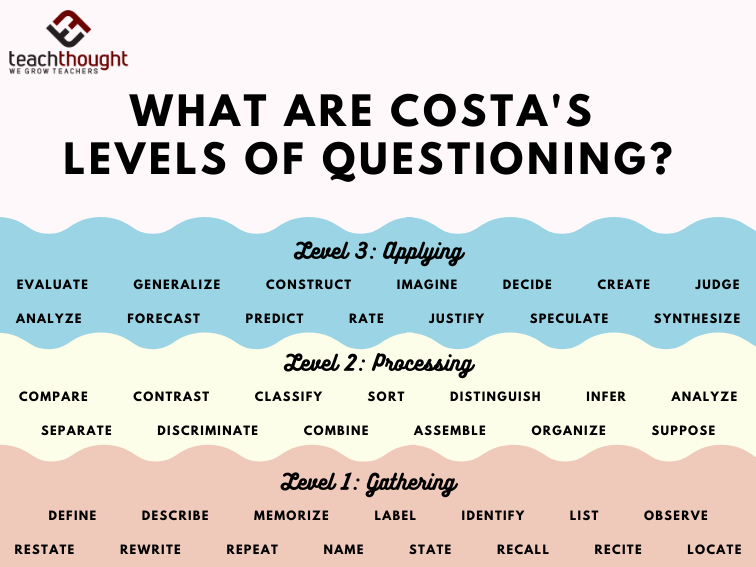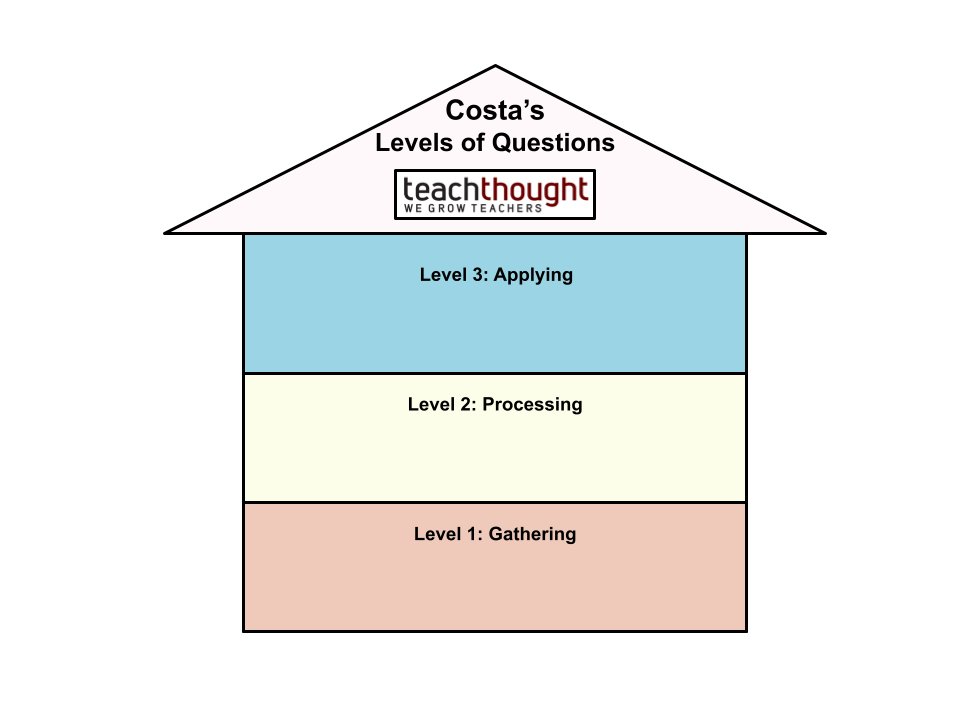

Costa’s Degrees of Questioning– created by educational researcher Art Costa– feature three rates of questioning made to advertise higher-level reasoning and query.
Comparable to Blossom’s taxonomy , Costa’s lower level prompts pupils to utilize even more basic professors; as students go up in levels, the questions trigger them to utilize even more complex reasoning abilities. Via years of research on human strength, Dr. Costa additionally identified the 16 Routines of Mind , a set of behaviors that support students in navigating the obstacles that commonly happen in school and life, in general. Several of Dr. Costa’s 16 habits– thinking interdependently, innovating, collecting data, and using previous expertise to brand-new scenarios– both require and reinforce greater degrees of doubting.
There is a substantive quantity of research study that supports Dr. Costa’s schema. Newmann (1993 located that higher-order thinking compels students to “adjust information and ideas in ways that transform their definition,” and “expects pupils to resolve troubles and create meaning for themselves,” which lines up with a constructivist sight of education
Costa’s Degrees of Questioning are generally illustrated making use of the allegory of a house with 3 floors:


Level 1: Collecting
Level 1 inquiries generally call for students to collaborate with details ‘on the web page.’ Solution to degree 1 questions are usually literal; definition, a trainee can literally point to the response on a web page.
We have actually formerly written about Blossom’s Taxonomy power verbs , so you can predict that Costa’s levels have their very own collection of power verbs, as well. Here are a few that you could discover at the beginning of Degree 1 questions:
- Define
- Explain
- Remember
- Label
- Determine
- List
- Observe
- Restate
- Rewrite
- Repeat
- Name
- State
- Recall
- State
- Find
- Select
- Suit
- Program
Level 1 inquiries by content location might look like these examples:
- Scientific research : Label the parts of a pet cell.
- Mathematics : State the formula for locating the volume of a cylinder.
- History : Suit the name of the queen to their corresponding country.
- English Language Arts : Locate the location in the story where the orgasm takes place.
You can see just how the majority of these Degree 1 power verbs require pupils to recall info, which is a vital ability in its own right. Nonetheless, educators should pursue the majority of their questions to drop in Degree 2 or 3, which test students to make use of higher-order thinking abilities.
Degree 2: Handling
Degree 2 questions go a step even more than Level 1, motivating trainees to refine information by ‘analysis between the lines.’ While students might need to use literal information to develop their feedbacks, Level 2 requires them to process that info with what they already know in order to make brand-new links.
Below are some instances of Degree 2 power verbs:
- Contrast
- Comparison
- Classify
- Kind
- Distinguish
- Infer
- Assess
- Different
- Differentiate
- Combine
- Assemble
- Organize
- Expect
Degree 2 questions by material area might turn up in the following means:
- Scientific research : Contrast the procedures of mitosis and meiosis.
- Math : Categorize the geometric forms according to their variety of sides and angles.
- History : Put together the following historical occasions in the order of value, from many to least.
- English Language Arts : Analy ze the impact that the writer’s tone carries the general significance of the message.
Can you see exactly how Degree 2 concerns go an action even more than Degree 1 More than merely throwing up details, learners take it and ‘do something’ with it. They categorize, make distinctions, and compare/contrast it versus one more part to see how it affects the entire. These sort of skills can stimulate interest and build a bridge to the questions that really produce imagination and higher-level thinking.
Level 3: Applying
While Level 1 questions trigger pupils to work with input, and Level 2 questions test them to refine that input in order to make brand-new connections. Here, trainees take part in the highest-level reasoning abilities to produce a result. This could arise from making assessments and evaluations, testing services to numerous issues, or making predictions.
We have actually included some examples of Level 3 power verbs listed below:
- Assess
- Generalise
- Build
- Visualize
- Choose
- Produce
- Court
- Analyze
- Forecast
- If/then
- Forecast
- Price
- Validate
- Guess
- Synthesize
- Build
- Assume
Level 3 concerns by material location may appear like the following:
- Science : Based on data from the last years of hurricane task in the southeast U.S., forecast exactly how the regularity of storm task will transform in the next ten years.
- Math : Price the chance of a governmental candidate winning the political election based on securing the selecting votes from the adhering to united state states: Florida, California, Virginia, New York City, Illinois.
- History : Create a social compact that thinks about the impacts of globalization and technical improvement in the 21 st century.
- English Language Arts : Develop a disagreement that protects or shoots down obligatory staff member inoculation policies in the USA.
Whether planning for discussion-based tasks, project-based discovering, or independent inquiry, educators need to aim to orient the majority of trainee thinking and involvement at Degrees 2 and 3 Evaluations that prompt students to recall basic facts (such as the day of a historical event, or the name of an author, or the formula for a formula) don’t actually assess trainees’ capacity to apply new skills or details to new contexts. A Level 2 or 3 question would certainly challenge students to make connections with basic info. For instance, rather than remembering a simple day, a much more flexible concern would certainly ask trainees to anticipate, based upon the time in background that a particular event occurred, the likelihood of it repeating, offered a comparable sociopolitical ambience. Along the same lines, instead of remembering the names of renowned writers, a teacher might challenge students to make a debate for just how an author would discuss a specific contemporary concern.
In “A Speak to Educators,” James Baldwin described the paradox of education: “As one begins to come to be mindful, one begins to take a look at the culture in which [they] are educated.” Level 2 (and mainly, degree 3 inquiries aim to cultivate this type of reaction in trainees, to create them to tilt their heads, do double-takes, explain disparities, interrupt the status, identify flaws in current establishments, and develop ingenious remedies for those problems. These are the inquiries that motivate us ahead up with even more inquiries, to think about our reasoning, and to evolve– both as people and societies.